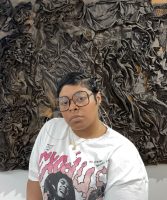CAA News Today
CAA Board President’s Open Letter to North American College and University Presidents
posted by CAA — February 09, 2024
On behalf of the College Art Association (CAA) and its Advocacy Committee, I write in support of an open letter from the Middle East Studies Association (MESA) written on December 18, 2023. As a partner learned society under the American Council of Learned Societies (ACLS), we urge you to uphold and protect academic and creative freedom on your campuses.
Since October 2023, we have seen a surge in threats to faculty, students, and college staff. The current Gaza-Israel conflict has generated widespread academic and scholastic debate; we call upon you during this difficult time to protect free speech and to defend academic freedom for all campus community members. We also urge you to refrain from censoring artist exhibitions in your campus galleries and museums.
CAA honors diversity and reflects an extraordinary range of cultures, perspectives, education, and experiences that make the advancement of art and design integral to our global constituencies and to culture at large.
CAA is committed to ensuring academic freedom and freedom of artistic expression and exhibition. We agree with MESA that “free speech is essential for any democratic polity, and this country’s institutions of higher education should be places in which even the most controversial and unpopular views can be expressed, debated and criticized. At the same time, all students deserve equal access to education, free from harassment and discrimination. Unfortunately, we are witnessing a dramatic increase in antisemitic, anti-Palestinian, anti-Arab and anti-Muslim harassment and discrimination on our campuses.”
As university leaders, you bear responsibility during charged political times to safeguard academic freedom, freedom of expression and artistic practice, as well as the physical welfare of all members of your community. We urge you to protect students, faculty, and staff and honor their right to freedom of speech without fear of intimidation, harassment, or retaliation.
Sincerely,

Jennifer Rissler, PhD
President, Board of Directors
CAA | Advancing Art and Design
caa.reviews Seeks Two Editorial Board Members and Field Editors in Seven Areas
posted by CAA — February 08, 2024
caa.reviews seeks two new Editorial Board Members to each serve a four-year term, July 1, 2024–June 30, 2028.
CAA encourages applications from candidates with a strong record of scholarship who are committed to the imaginative development of caa.reviews. An online, open-access journal, caa.reviews is devoted to the peer review of recent books, museum exhibitions, and projects relevant to the fields of art history, visual studies, and the arts.
The Editorial Board advises the Editor-in-Chief, guides Field Editors in their process of identifying books, exhibitions, and review authors suitable for the journal, and proposes new initiatives for the journal’s editorial programs. Editorial Board Members stay abreast of trends and issues in the field by attending and reporting on sessions at the CAA Annual Conference, as well as other academic conferences, symposia, and events in their fields.
The caa.reviews Editorial Board meets three times a year, twice in the spring and fall and once at the Annual Conference each February. Meetings in the spring and fall are currently held by videoconference, while the February meeting typically occurs in person. Members of all editorial boards at CAA volunteer their services without compensation or financial support for travel to and accommodations at the Annual Conference
Candidates must be current CAA members and should not currently serve on the editorial board of a competing journal or another CAA editorial board or committee. Nominations and self-nominations are welcome. Nominators should ascertain their nominee’s willingness to serve before submitting a letter of nomination. Please email a letter of nomination or self-nomination, describing your nominee’s interest in and qualifications for appointment, the nominee’s CV, and contact information to Eugenia Bell, Editorial Director, ebell@collegeart.org. Please include the subject line caa.reviews Editorial Board Member.
Deadline: Monday, May 6.
CAA is also inviting nominations and self-nominations for individuals to join the caa.reviews Council of Field Editors for a three-year term July 1, 2024–June 30, 2027 (renewable once). An online, open-access journal, caa.reviews is devoted to the peer review of new books, museum exhibitions, and projects relevant to art history, visual studies, and the arts. Candidates may be artists, art historians, art critics, art educators, curators, or other art professionals with stature in the field and with experience writing or editing books and/or exhibition reviews; institutional affiliation is not required.
CAA is searching for Field Editors in the following fields:
- Art of the Ancient Mediterranean, Europe, and West Asia
- Latin American Art
- Photography
- Art of the Ancient Americas
- Exhibitions: Southeast
- Exhibitions: Southwest
- African Art
Working with the caa.reviews Editor-in-Chief, the caa.reviews Editorial Board, and CAA’s staff editor, each Field Editor selects content to be reviewed, commissions reviewers, and considers manuscripts for publication. Field Editors for books are expected to keep abreast of newly published and important books and related media in their fields of expertise, and those for exhibitions should be aware of current and upcoming exhibitions (and other related projects) in their geographic regions.
The Council of Field Editors meets once a year in February at the CAA Annual Conference. Members of all CAA committees and editorial boards volunteer their services without compensation or financial support for travel to and accommodations at the Annual Conference.
Candidates must be current CAA members and should not be serving on the editorial board of a competing journal or another CAA editorial board or committee. Nominations and self-nominations are welcome. Nominators should ascertain their nominee’s willingness to serve before submitting a letter of nomination. Please email a letter of nomination or self-nomination describing your nominee’s interest in and qualifications for appointment, the nominee’s CV, and contact information to Eugenia Bell, Editorial Director, ebell@collegeart.org. Please include the subject line caa.reviews Field Editor.
Deadline: Monday, May 6.
CAA 2023 Professional Development Fellows Announced
posted by CAA — February 05, 2024
Congratulations to our 2023 Professional Development fellows, Zoe Weldon-Yochim, University of California, Santa Cruz (Art History) and Kelly Tapia-Chuning, Cranbrook Academy of Art (Visual Art)!
Honorable Mentions: Jocelyn E. Marshall, Emerson College (Art History); Breanna Reiss, University of New Mexico (Art History); Jessica Monette, Stanford University (Visual Art).
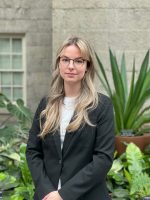
Zoe Weldon-Yochim is a PhD Candidate in Visual Studies at the University of California, Santa Cruz, whose areas of specialization include the art and visual culture of the United States, global contemporary art, and the theories and methods associated with ecocriticism. Her research involves attending to how various artists grapple with the difficulties of visuality and environmental injustices, particularly the long-term and often invisible slow violence of US militarism, nuclear toxicities, and extraction. Her dissertation, “Atomic Afterlives: Visualizing Nuclear Toxicity in Art of the United States, 1979–2011,” focuses on a selection of underrepresented American artists whose work, stemming from genealogies of research-based conceptual art and documentary practices, brings nuclear histories and concerns into aesthetic form in singular, conflictual, and shared ways. In this project, Weldon-Yochim examines how diverse visual approaches—such as installation, photography, print media, and painting—mediate, represent, and give agency to the nuclear and its atomic afterlives. Her research illuminates burgeoning artistic conceptualizations of the intersection of militarism and environmentalism during and beyond the last decade of the Cold War, where particular women, Indigenous, and Asian American artists mobilized varying visual grammar to consider the interconnectedness of environmental injustices and an ever-expanding US military system. Weldon-Yochim’s work has been supported by the American Council of Learned Societies and the Henry Luce Foundation, the Smithsonian American Art Museum, the Center for Advanced Study in the Visual Arts, and numerous university grants.
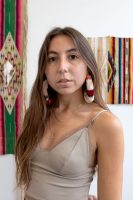
Kelly Tapia-Chuning is a mixed-race Chicana artist of Indigenous descent from southern Utah who is currently based in Detroit. Tapia-Chuning’s work forms as a response to her family’s histories of assimilation, questioning power dynamics attached to representation, racial identity, and language. Tapia-Chuning utilizes research, textile deconstruction, and needle-felting to convey the dichotomy of being nepantla, born in-between spaces and cultures.
In 2020, she received a BFA in Studio Arts from Southern Utah University and is pursuing an MFA in Fiber at Cranbrook Academy of Art, where she was awarded a Gilbert Fellowship. Tapia-Chuning’s work has been included in exhibitions at the Utah Museum of Contemporary Art, GAVLAK (Los Angeles), Onna House (East Hampton, NY), The Border Project Space (NY), and solo exhibitions with Red Arrow Gallery (Nashville, TN) and Harsh Collective (NY). She has been an artist in residence at Stove Works (Chattanooga, TN), and Zion National Park, in Utah. Tapia-Chuning’s work is in numerous public and private collections across the US.
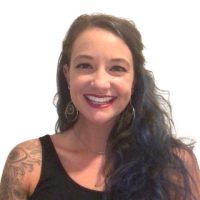
Jocelyn E. Marshall is faculty in the Departments of Visual & Media Arts and Writing, Literature, & Publishing at Emerson College. She previously was a Dissertation Scholar at Brandeis University’s Women’s Studies Research Center. Their interdisciplinary projects focus on contemporary US-based diasporic women and LGBTQ+ artists and writers, researching relationships between historical trauma and queer and feminist activism. Her work has appeared or is forthcoming in the Journal of American Culture, Women & Performance: A Journal of Feminist Theory, Public Art Dialogue, and elsewhere. In 2022, they co-edited Trauma-Informed Pedagogy: Addressing Gender-Based Violence in the Classroom, and in 2023 edited a multimedia issue of Rutgers University’s Rejoinder journal, themed Textual-Sexual-Spiritual: Artistic Practice and Other Rituals as Queer Becoming and Beyond. She also curates contemporary art exhibitions, including Being In-Between | In-Between Being (2020–21) and Creativity in the Time of Covid-19 (2023). She currently co-chairs the Gender & Feminisms Caucus at the Society for Cinema & Media Studies and is a contributing editor at Art Journal Open for the Feminist Interview Project.
Dr. Marshall’s research has been supported by, among other institutions, the Mark Diamond Research Foundation, J. Burton Harter Foundation, and New York Public Library. Her first book project draws from interviews and archival research to connect select US-based Asian and Latinx diasporic women artists as an underexamined cohort in feminist art history, contextualizing their aesthetic and poetic interventions as coterminous with shifts in US trauma studies and feminist theory. A portion of this project received Honorable Mention for the 2022 National Women’s Studies Association-Feminist Formations Paper Award.
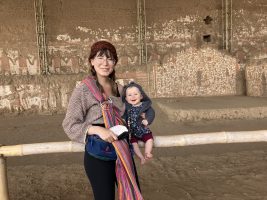 Breanna Reiss is a PhD candidate at the University of New Mexico who studies pre-Hispanic ceramics, primarily from coastal Ecuador and northern Peru, with a focus on their iconography and elements of their composition. She also received her MA from UNM where, in partnership with the Earth and Planetary Sciences Department, she examined the chemical composition of rare blue and blue-green post-fire ceramic figurine colorants from Ecuador. Her dissertation explores ancient Moche plant motifs, relating them to identifiable species and exploring their contextual relationships to narrative scenes. This plantcentric approach has identified several biomes and ecological indicators important to Moche culture. Along with teaching introductory art history courses, she has received numerous fellowships with UNM’s Center for Southwest Research and the Digital Initiatives and Scholarly Communication Department, and currently works for Georgia Tech Research Institute.
Breanna Reiss is a PhD candidate at the University of New Mexico who studies pre-Hispanic ceramics, primarily from coastal Ecuador and northern Peru, with a focus on their iconography and elements of their composition. She also received her MA from UNM where, in partnership with the Earth and Planetary Sciences Department, she examined the chemical composition of rare blue and blue-green post-fire ceramic figurine colorants from Ecuador. Her dissertation explores ancient Moche plant motifs, relating them to identifiable species and exploring their contextual relationships to narrative scenes. This plantcentric approach has identified several biomes and ecological indicators important to Moche culture. Along with teaching introductory art history courses, she has received numerous fellowships with UNM’s Center for Southwest Research and the Digital Initiatives and Scholarly Communication Department, and currently works for Georgia Tech Research Institute.
Jessica Monette is an interdisciplinary artist living in the Bay Area whose creative endeavors span the diverse realms of painting, sculpture, installation, and collage. Materiality forms the core of Monette’s artistic expression, each chosen element serving as a deliberate conduit for context and personal narrative. Her repertoire includes a wide array of materials—from house paint, plaster, and thin-set mortar to found and fabricated objects, site-specific soil, rope, nails, cotton, railroad spikes, water from the Mississippi River, and clothing collected from various family members. To New Orleans–born Monette, these materials aren’t just art components, her materials are agents for rebuilding and storytelling. The cataclysmic events of Hurricane Katrina in 2005 undergird her work and serve as a potent visual metaphor for contemporary colonial sediment, encapsulating a temporal lens that reveals the nuances of systemic oppressions. Economic inequality, gentrification, unequal aid distribution, environmental racism, forced migration, and the erosion of cultural heritage—Katrina becomes a concentrated manifestation of these issues.
Monette’s reconstruction of her familial archive, challenges systems of oppression that are created to perpetuate silence. The threads of her narrative, woven together through materials and thematic exploration, contribute to a powerful dialogue that invites viewers to reexamine the need for persistence of cultural memory and the tenacity of the human spirit.
Learn more about CAA Professional Development Fellowships here.



